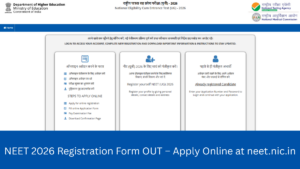7 Easy and Powerful Tips to Ace Your Half-Yearly Exams: Ever wished the Class 10th and 12th exams could feel less like a nightmare and more like a challenge you want to win? Well, the Half Year exams are one of them – they creep up just when you are getting comfortable with school life. But no worries! Here’s a secret: They are not out to frighten you; they are designed to revive you for the finals. It’s a practice battle before the war! And, no, you don’t need to worry about burning the midnight oil or stressing for hours or all day; instead, staying calm and confident for the exams can be accomplished through planning and being smart about your exams. Students can take a look at the 7 Easy and Powerful Tips to Ace their upcoming Half-Yearly Exams below that will help them stay calm, confident, and ready for the half-yearly exams without any worry.
Why do Students Need a Study plan to prepare for Half-Yearly Exams?
Entering your Class 10th or 12th half-yearly exams without a plan is like going onto the cricket field with no clue about the batting order – you’ll waste valuable time figuring it all out instead of scoring runs. A structured exam strategy is your winning game plan. Remember, exams aren’t just about studying harder – it’s about studying smarter. The tips below will take you through step-by-step of how to prepare effectively and perform to your absolute best on exam day. It assists you:
- Save time by knowing exactly what to study and when.
- Reduce stress by avoiding last-minute panic.
- Stay focused on important topics instead of random reading.
- Improve memory through organised revision.
- Boost confidence by being fully prepared.
7 Easy and Powerful Tips to Ace Your Half-Yearly Exams Like a Topper
Just because you are preparing for the class 10th or 12th half-yearly exams doesn’t mean you need to feel anxious and stressed. You don’t have to study excessively to feel confident and beneficial, meaning you can study smartly, feel confident, and score well on your assessments. The following 7 easy and powerful tips to revise for your half-yearly exams can help you plan time, properly revise, and have a clear mind. From time management and study schedules to health and wellbeing, these tips are designed to help you learn more easily and quickly, which means you could perform better on your half-yearly exams! If you follow these tips, you will walk into the examination room feeling confident about your performance.
1. The “2-Hour Power” Rule
Studying for hours without a break is like running a marathon without water — your energy and focus will crash. Instead, break your study into focused 2-hour sessions. After each session, take a 10–15 minute break to stretch, walk, grab a light snack, or just relax your eyes. These short breaks give your brain a chance to recharge, making your next study block more productive and keeping your memory sharp.
2. Write It, Lock It
Simply reading your notes can make you feel prepared, but it’s easy to forget later. Writing forces your brain to process the information more deeply, which improves memory. Create handwritten summaries, key points, or mind maps in your own words. Use colorful pens, sticky notes, or diagrams to make learning more fun and visually memorable. The more personal and creative your notes are, the better you’ll remember them.
3. Practice Like You are in the Exam Hall
Don’t just go through solved examples in your textbook — actively solve problems yourself. Set a timer and practice answering questions in the same time frame as your actual exam. This builds your speed, improves accuracy, and helps you stay calm under time pressure. By practising regularly, you’ll also identify which topics you need to work on before the big day.
4. Stay Organised, Stay Ahead
A messy study space can make your mind feel cluttered, too. Keep your desk tidy, group your books and notes by subject, and label everything clearly. Use a study timetable or planner to track what you’ve studied and what’s left. Organisation not only saves time but also keeps you focused on your goals without unnecessary distractions.
5. Switch It Up
Studying the same subject for hours can cause mental fatigue and boredom. Keep your brain fresh by switching between different subjects or topics after a set period. For example, after a math session, move on to literature or science. This variety challenges your brain in new ways, making it easier to absorb and retain information.
6. Morning Recap Ritual
Your mind is most alert in the morning, making it the perfect time for a quick revision of what you studied the day before. Spend 10–15 minutes going over key points, formulas, or definitions. This habit strengthens long-term memory through repetition and ensures you don’t forget important details before the exam.
7. Feed Your Brain the Good Stuff and take Sleep as it is part of your Syllabus
What you eat directly affects how well your brain works. Instead of relying on chips or sugary snacks, fuel your body with nutritious foods like fruits, vegetables, nuts, eggs, whole grains, and plenty of water. Healthy eating improves concentration, keeps your energy steady, and prevents the tiredness that comes from junk food crashes. And make a note that sacrificing sleep for late-night study sessions can actually hurt your performance. During sleep, your brain processes and stores the information you’ve learned. Aim for 7–8 hours of quality sleep each night. A well-rested brain thinks faster, recalls information more easily, and stays calm even in stressful exam situations.












 NEET UG 2026 Application Payment Failure...
NEET UG 2026 Application Payment Failure...
 NEET 2026 Registration Form (Out), Appli...
NEET 2026 Registration Form (Out), Appli...
 How to Start CUET PG LLB 2027 Preparatio...
How to Start CUET PG LLB 2027 Preparatio...








